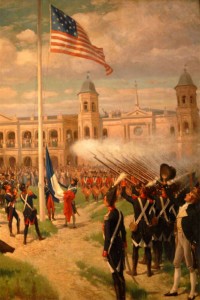
Manifest Destiny. That was the essence of an early American philosophy which forever changed this nation. This philosophy was, in essence, the belief that God had destined the United States to spread across the North American continent and rule “from sea to shining sea”. The term “manifest destiny” itself was first coined in 1845 by the American writer John L. O’Sullivan. Although O’Sullivan coined the term the philosophy itself is as old as the nation.
Ideas have consequences and philosophies like the manifest destiny are ideas, and therefore, have consequences. Some of the consequences were good, others were not. The first actions taken towards expansion from sea to shining sea were taken in 1803.
When the United States had achieved official independence in 1783 the boundaries of the new nation were Canada in the north, Spanish Florida in the south, the Atlantic Ocean in the east and the “mighty” Mississippi River in the west. The land west of the Mississippi was Spanish controlled “Louisiana”. In the early 1800s it became apparent to the people of the United States that control of Louisiana would be key to keeping trade along the Mississippi reliable. The Spanish, owners of the city of New Orleans, had a nasty habit of restricting access to the Gulf of Mexico at random times. This obviously hurt the business of Mississippi River farmers.
Meanwhile, the original owners of Louisiana, the French, wanted it back. Napoleon Bonaparte was scheming to reestablish a French empire in North America. Gaining Louisiana would be key to his plan. He masterminded a treaty with Spain that, in short, would enable him to rip the Spaniards off and exchange the vast Louisiana with a small Italian territory which he didn’t even intend to hand over anyway.
Napoleon’s plan fell apart when his army was mauled on the tiny Caribbean island of Hispaniola, (now Haiti and the Dominican Republic). Unable to effectively station and supply an army in Louisiana, Napoleon decided to get rid of it. The French sold the territory to the willing Americans for $15 million…or about 4 cents per acre.
The purchase of Louisiana in 1803 opened up an entire new frontier to American explorers. The United States had taken the first step towards growing from sea to shining sea. It had also taken the first step towards bitter disunity. As the country further west it also grew further apart. As the nation expanded would slavery expand with it? That question would be the question of the century for America.
